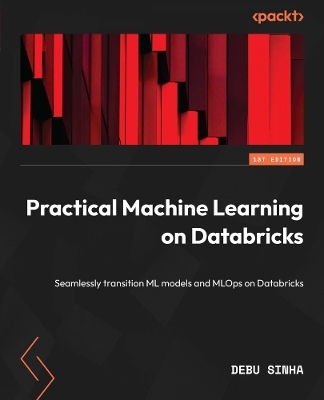
Practical Machine Learning on Databricks
Packt Publishing Limited (Verlag)
978-1-80181-203-0 (ISBN)
Key Features
Learn to build robust ML pipeline solutions for databricks transition
Master commonly available features like AutoML and MLflow
Leverage data governance and model deployment using MLflow model registry
Purchase of the print or Kindle book includes a free PDF eBook
Book DescriptionUnleash the potential of databricks for end-to-end machine learning with this comprehensive guide, tailored for experienced data scientists and developers transitioning from DIY or other cloud platforms. Building on a strong foundation in Python, Practical Machine Learning on Databricks serves as your roadmap from development to production, covering all intermediary steps using the databricks platform.
You’ll start with an overview of machine learning applications, databricks platform features, and MLflow. Next, you’ll dive into data preparation, model selection, and training essentials and discover the power of databricks feature store for precomputing feature tables. You’ll also learn to kickstart your projects using databricks AutoML and automate retraining and deployment through databricks workflows.
By the end of this book, you’ll have mastered MLflow for experiment tracking, collaboration, and advanced use cases like model interpretability and governance. The book is enriched with hands-on example code at every step. While primarily focused on generally available features, the book equips you to easily adapt to future innovations in machine learning, databricks, and MLflow.What you will learn
Transition smoothly from DIY setups to databricks
Master AutoML for quick ML experiment setup
Automate model retraining and deployment
Leverage databricks feature store for data prep
Use MLflow for effective experiment tracking
Gain practical insights for scalable ML solutions
Find out how to handle model drifts in production environments
Who this book is forThis book is for experienced data scientists, engineers, and developers proficient in Python, statistics, and ML lifecycle looking to transition to databricks from DIY clouds. Introductory Spark knowledge is a must to make the most out of this book, however, end-to-end ML workflows will be covered. If you aim to accelerate your machine learning workflows and deploy scalable, robust solutions, this book is an indispensable resource.
Debu is an experienced Data Science and Engineering leader with deep expertise in Software Engineering and Solutions Architecture. With over 10 years in the industry, Debu has a proven track record in designing scalable Software Applications, Big Data, and Machine Learning systems. As Lead ML Specialist on the Specialist Solutions Architect team at Databricks, Debu focuses on AI/ML use cases in the cloud and serves as an expert on LLMs, Machine Learning, and MLOps. With prior experience as a startup co-founder, Debu has demonstrated skills in team-building, scaling, and delivering impactful software solutions. An established thought leader, Debu has received multiple awards and regularly speaks at industry events.
Table of Contents
ML Process and Challenges
Overview of ML on Databricks
Utilizing Feature Store
Understanding MLflow Components
Create a Baseline Model for Bank Customer Churn Prediction Using AutoML
Model Versioning and Webhooks
Model Deployment Approaches
Automating ML Workflows Using the Databricks Jobs
Model Drift Detection for Our Churn Prediction Model and Retraining
CI/CD to Automate Model Retraining and Re-Deployment.
| Erscheinungsdatum | 03.11.2023 |
|---|---|
| Verlagsort | Birmingham |
| Sprache | englisch |
| Maße | 191 x 235 mm |
| Themenwelt | Informatik ► Datenbanken ► Data Warehouse / Data Mining |
| ISBN-10 | 1-80181-203-9 / 1801812039 |
| ISBN-13 | 978-1-80181-203-0 / 9781801812030 |
| Zustand | Neuware |
| Informationen gemäß Produktsicherheitsverordnung (GPSR) | |
| Haben Sie eine Frage zum Produkt? |
aus dem Bereich


